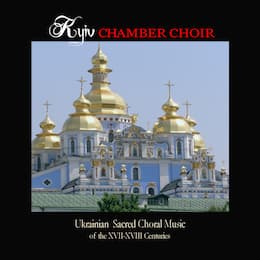
UKrainian Sacred Choral Music
On 17 July 2014, Malaysia Airlines Flight 17 with 283 passengers and 15 crew on board was shot down while flying over eastern Ukraine. Everybody on that flight was killed by a surface-to-air-missile launched from pro-Russian separatist-controlled territory in Ukraine. A weapon of the Russian Federation, the missile was transported from Russia on the day of the crash, and the launch system returned to Russia afterwards. In a mockery of human decency and human intelligence, the Russian government denied any and all involvement. To remember the first casualties of the current unprovoked War on Ukraine, I wrote a short article about the Ukrainian Cossack Ivan Mazeppa and his quest for Ukrainian independence from Poland and Russia.
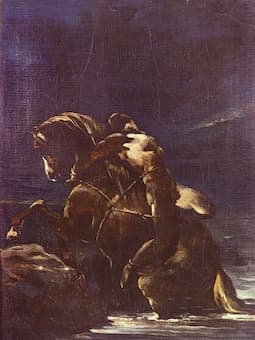
Théodore Géricault: Der Page Mazeppa
Eight years later, we are dealing with a full-blown criminal invasion of an independent country and its democratically elected government. And yet once again, the arguments brought forth are mired in the age-old rhetoric that fails to fundamentally understand the notions of Nationality as a condition and nationalism as an attitude. On the basis of its linguistic, ethnic, religious, and cultural self-description, Ukraine has long been an independent entity, regardless of how many people have been bussed in over the centuries.
Svitlana Azarova
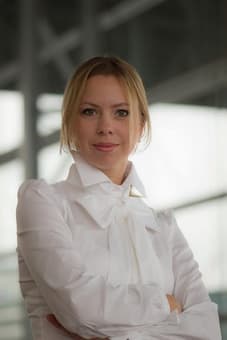
Svitlana Azarova
You don’t have to go far afield to discover distinct voices of Ukrainian identity and independence. In fact, all we have to do is listen to the musical expressions of Ukrainian composers, including Svitlana Azarova. Born on 9 January 1976 in the Ukrainian SSR, she graduated from the Odessa State Conservatoire in 2000 with a degree in composition. A Member of the Ukrainian Composers’ Union, her works have been performed on numerous Festivals and Arts Projects, and she has received important commissions from Denmark, France, the Netherlands, Switzerland, and the Polish Institute in Kiev. The title of her 2008 work “Beyond Context” actually seems to perfectly describe the current political situation.
Svitlana Azarova: Beyond Context
Sergei Bortkiewicz
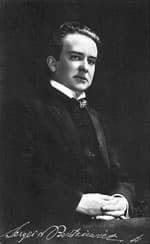
Sergei Bortkiewicz
Sergei Bortkiewicz (1877-1952) described himself as a romantic and a melodist, and he had an emphatic aversion of what he called modern, atonal and cacophonous music. His musical style builds on the sounds and structures of Chopin, Liszt and the unmistakable influences of Tchaikovsky, Rachmaninoff and early Scriabin. Born of Polish ancestry in Kharkiv in the Ukraine, Bortkiewicz initially studied in St. Petersburg but soon furthered his musical education at the Leipzig Conservatory. After establishing himself as a pianist and composer he initially settled in Berlin, but during World War I he was forced to leave Germany. Bortkiewicz was back in Kharkiv just in time to witness the Russian revolution. The Red Army surrounded his estate, and the composer barely managed to escape by steamer to Constantinople in November 1919. By 1922 Bortkiewicz had arrived in Austria, and obtained citizenship in 1925. This Ukrainian composer and pianist was oppressed by the Soviets and the Nazis, a refugee and survivor of two World Wars, yet he composed wonderfully rich, appealing and colorful music. Given his turbulent and displaced life, it comes as no surprise that his 3rd Piano Concerto carries the Latin subtitle “per aspera ad astra,” (Through hardship to the Stars).
Sergei Bortkiewicz: Piano Concerto No. 3
Borys Lyatoshynsky
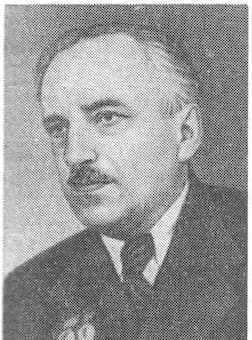
Borys Lyatoshynsky
On 24 August 1991, Ukraine officially restored itself as an independent state encompassing most of its traditional lands with internationally recognized borders. Until then, a fully independent state of Ukraine simply did not exist. Only at that moment did the Ukrainian Soviet Socialist Republic become simply Ukraine. “Culturally, 1991 brought Ukrainian artists and organizations of all kinds the ability to interact directly across national borders. Before then, Moscow had crippled the culture’s ability to communicate directly with the rest of the world by bestowing or withholding its approval.” A music historian explains, “Many years ago I wrote that only three voices from the chorus of Ukrainian culture have received international recognition and acceptance; the sculptor Alexander Archipenko, the film-maker Alexander Dovzhenko and the poet Taras Shevchenko…Today, however, we are able to add the names of Borys Lyatoshynsky and Valentyn Silvestrov to that still short but ever-growing list.” In the 1920s and early 30s, Borys Lyatoshynsky (1895-1968) initiated the modern movement in Ukraine with a series of intense and highly expressive compositions “that reflect a central preoccupation with expressionism. His Sonata for Violin and Piano dates from 1926, and critics praised the work as “a viral, declamatory Sonata, somewhat Bartokian in outlook but full of sinewy drama.” Lyatoshinsky’s great musical erudition made him one of the spiritual fathers of the Kyiv avant-garde.
Borys Lyatoshinsky: Violin Sonata, Op. 19 (Solomiya Ivakhiv, violin; Angelina Gadeliya, piano)
Artemi Vedel
Artemi Vedel (1767-1808) was a military and liturgical composer of Ukrainian origin, who together with Maxim Berezovsky and Dmitry Bortniansky, is recognizes as one of the “Golden Three” Ukrainian composers of the 18th century. Born in Kyiv, he studied music and theoretical subjects at Kyiv Academia. According to contemporaries, “he had a beautiful voice, conducted a choir, and expertly played the violin in the Academy orchestra. When a request for a talented scholar of church music came from Moscow, Vedel spent four years in Russia. He returned to Kyiv and taught at the Kyiv Academy for a short time before accepting an invitation to enter the corps choir as Kappellmeister. By 1796 Vedel had moved to Kharkiv and headed the choir of the local governor-general.
“After the ascension of Paul I to the Russian throne, all cultural work was curtailed—military choirs, regimental orchestras, and other music centers were disbanded, and most administrative and music educational institutions were closed.” Vedel lost his job, and in May 1799, “on the basis of real or falsified writings about the Russian tsar, he was arrested and under the personal order of Paul I, imprisoned in an insane asylum for life.” He was only 32 years of age, and when Alexander I ascended to the throne, Vedel was released after nine years in prison, and “the fatally ill composer died in Kyiv at the age of 41.” His works were banned for a long time, but distributed in manuscripts and performed despite the ban. Vedel composed in various genres of choral music, but he is primarily remembered for his 12 sacred concertos, which demonstrate fluent command of classical polyphony. Infusing ancient Ukrainian liturgical monody with Ukrainian song folklore, Vedel was a master of developing lyrical and dramatic musical imagery.
Artemi Vedel: Concerto for Choir No. 2 “Save Me, O God” (Luminous Voices)
Vevhen Stankovych
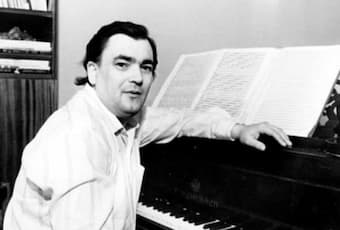
Vevhen Stankovych
Vevhen Stankovych, born in 1942, has been described as one of the central figures of contemporary Ukrainian music. He initially studied composition with Adam Soltys and subsequently Borys Lyatoshynsky and Myroslav Skoryk at the Kyiv Conservatory. He was himself appointed professor of composition at the Kyiv Conservatory in 1988, and was the chairman of the National Union of Composers of Ukraine from 2004 to 2010. A prolific composer who has written in a variety of genres, including music for over 100 films, Stankovych gradually developed “the different strands of avant-garde in Ukrainian music.” With his very first compositions, “Stankovych declared himself a composer of dramatic temperament. While his technique is contemporary, folkloric themes of Ukraine’s cultural groups (especially his native Carpathian roots) are paramount in his works.” Stankovych relies heavily on ethnographic sources, calling it “drinking from that bottomless well of collective memory.” For the composer, this has become a traditional method “for focusing the divergent energies of an awaking culture.” Critics have located Stankovych’s uniqueness in his “pronounced affinity for the vernacular and in his blending of folk motifs with orchestral colors, reproducing the unique aspects of the folk song, of multi-layered polyphony, and meditative lyricism.” Angel’s Touch is the result of a commission by the Ukrainian Institute of America to celebrate the 25th anniversary concert season of Music at the Institute in New York City. Neo-romantic melodies unfold over gently modernist ostinato patterns, and the work has been described as “embodying a child-like mysticism, exploring naivety, hope, and inner peace leading to enlightenment. Deliciously dark motifs are triumphed by happiness in the end.”
Yevhen Stankovych: Angel’s Touch (Solomiya Ivakhiv, violin; Angelina Gadeliya, piano)
Mykola Lysenko
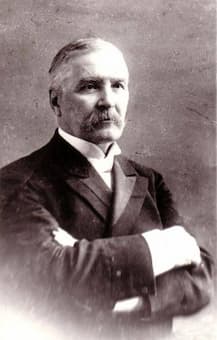
Mykola Lysenko
The composer, pianist, conductor, ethnomusicologist, pedagogue, and organizer Mykola Lysenko (1842-1912) is widely considered the acknowledged founder of the national movement in Ukrainian music. He studied music at an early age, and from early childhood Lysenko was interested in the folksongs of Ukrainian peasants and by the poetry of Taras Shevchenko. During his time at Kyiv University, Lysenko collected and arranged Ukrainian folksongs and published them in seven volumes. Initially, he had been a student of biology and only studied music privately. However, when he won a scholarship to further professional music studies, Lysenko went to Leipzig to study composition with Carl Reinecke and piano with Ignaz Moscheles. Returning to Kyiv, Lysenko was determined to establish a Ukrainian national school of music, but the Russian Imperial Music Society did not support his efforts. As a result, Lysenko never composed music set to the Russian language, nor did he allow any translations of his works into the Russian language. Since Ukrainian language was banned in print, Lysenko had to publish some of his scores abroad. Lysenko traveled to Saint Petersburg to take orchestration lessons from Rimsky-Korsakov in the mid-1870s, but his disdain for Great Russian autocracy impeded his career. Lysenko composed well over 120 art songs, a large collection of compositions for piano and chamber music, three cantatas for choir and orchestra, and a number of operatic works. His Ukrainian Suite Op. 2 is modeled after the suites of Bach, and utilizes his skills as a composer, ethnographer, and pianist. Featuring a distinct national spirit, “Lysenko showcases the modern piano’s capabilities with brilliant passages, wide range of colors, and intricate counterpoint.”
Mykola Lysenko: Suite on Ukrainian Themes, Op. 2 (Anna Shelest, piano)
Alexander Shchetynsky
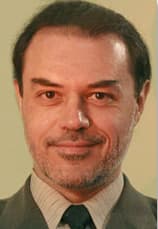
Alexander Shchetynsky
Born in 1960, the Ukrainian composer Alexander Shchetynsky is known throughout Europe and North America. In fact, two albums of his music have already been released in the United States and France. In addition, his multi-faceted compositions have received awards at six international composer’s competitions, and his quasi-serial procedures pay special attention to attractiveness of sound material and to melody as a source of expression. A musicologist wrote, “Another fundamental feature of his music is its rhythmic, structural, and formal flexibility which provokes a feeling of self-development of initial micro-thematic patterns. The idea of modern spirituality became an impulse for many of his vocal and instrumental compositions and especially his three operas and choral works.” Particularly his choral works shine with haunting luminosity and sublime spirituality. Shchetynsky provides a synthesis of a multitude of musical styles, as well as of secular and sacred traditions, conveyed in a uniquely personal voice. “These include old and new Orthodox Church chant, Ukrainian song melodies, Gregorian Chant, early polyphony, Baroque, 19th-century operatic melodies and innovative 20th-century compositional techniques.” The composer writes: “I aim at overcoming eclecticism and finding a new unity in the combination of those musical elements that historically never existed next to each other.”
Alexander Shchetynsky: Uznay Sebe (Know Yourself) (Cantus Chamber Choir; Emil Sokach, cond.)
Vladmir Horowitz
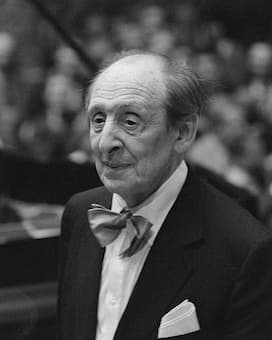
Vladmir Horowitz
Everybody knows that Vladmir Horowitz (1903-1989) is considered one of the greatest pianists of all time. Capable of producing an exceptionally wide range of tone color, his style frequently involved vast dynamic contrasts, “with overwhelming double-fortissimos followed by sudden delicate pianissimos.” In addition, he exuded a kind of high-voltage charisma that, in his time, could be matched only by Toscanini, Callas and Pavarotti. What is generally less well known is the fact that Horowitz was born in Kyiv, at that time occupied by the Russian Empire. His uncle Alexander was a student and close friend of Alexander Scriabin, and when Horowitz was 10 he did play for Scriabin, “who told his parents that he was extremely talented.” Horowitz received his initial piano instruction from his mother, and when he entered the Kyiv Conservatory, Vladimir Puchalsky, Sergei Tarnowsky, and Felix Blumenfeld taught him. He played his first solo recital in Kharikiv in 1920, and soon thereafter toured Russia, being paid in bread, butter and chocolate rather than money, due to the economic hardship caused by the Civil War. During the 1922–23 season he performed 23 concerts of eleven different programs in one city alone, establishing himself as one of the premiere pianists of this time. Yet, despite his early success as a pianist, Horowitz claimed that “he wanted to be a composer and undertook a career as a pianist only to help his family, who had lost their possessions in the Russian Revolution.” Under the pretense of wanting to study with Artur Schnabel in Berlin, Horowitz left for the West never intending to return. After an absence of 61 years, and having sworn to never return, the legendary pianist did come back to his native soil for a two-concert tour. However, he only did so because the monolith USSR had finally failed miserably. The world had moved on—at least the vast majority has done—and any renewed dream of a Russian Empire today is nothing more than a soap bubble. Ukrainian artists and musicians, as we have seen, have long understood that particular fact.
For more of the best in classical music, sign up to our E-Newsletter
Vladimir Horowitz: “Danse Excentrique”

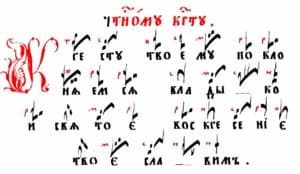
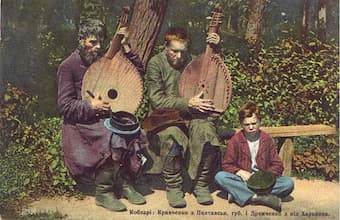
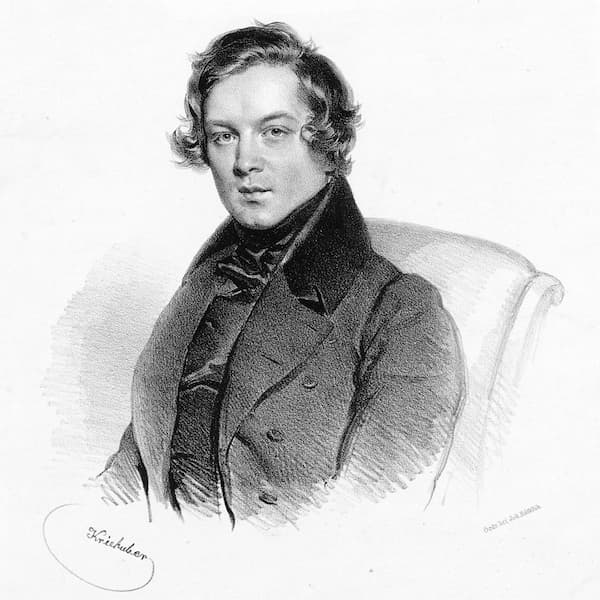
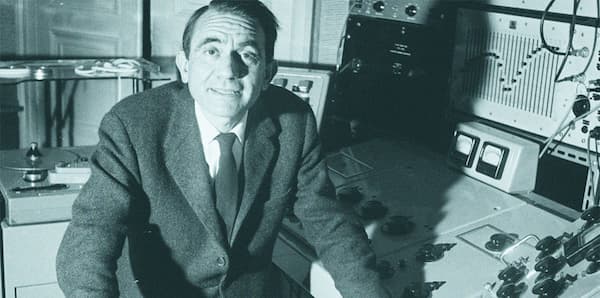
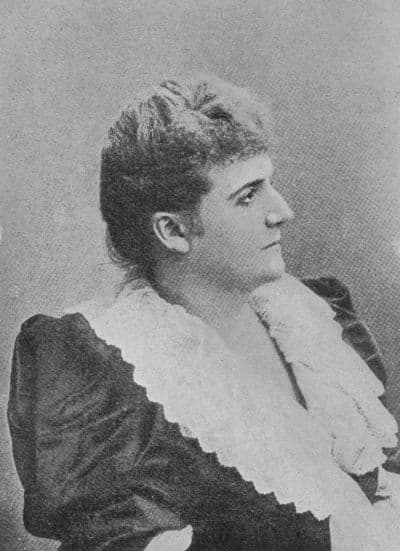

And what about the legendary Lubka Kolessa??
She was a formidable piano teacher too. I studied with her at McGill in 1970
What about Nathan Milstein, David Oistrakh and Sviatoslav Richter? The world has become a more musical place because of Ukrainian musicians.
please add Bortnianski.
Thank you for the article. I suggest adding Tchaikovsky as he had Ukrainian heritage and many of his compositions were based on Ukrainian folk songs and melodies. The world needs to know about Tchaikovsky’s Ukrainian background.
Lubomyr Melnik should be included as a living and gifted composer pianist.